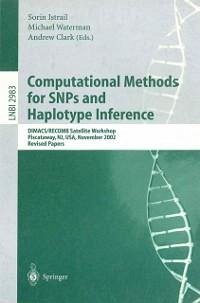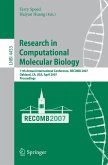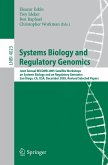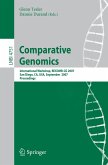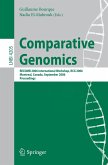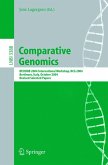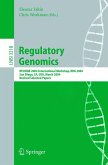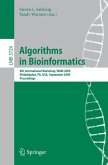Computational Methods for SNPs and Haplotype Inference (eBook, PDF)
DIMACS/RECOMB Satellite Workshop, Piscataway, NJ, USA, November 21-22, 2002, Revised Papers
Redaktion: Istrail, Sorin; Clark, Andrew; Waterman, Michael
40,95 €
40,95 €
inkl. MwSt.
Sofort per Download lieferbar

20 °P sammeln
40,95 €
Als Download kaufen

40,95 €
inkl. MwSt.
Sofort per Download lieferbar

20 °P sammeln
Jetzt verschenken
Alle Infos zum eBook verschenken
40,95 €
inkl. MwSt.
Sofort per Download lieferbar
Alle Infos zum eBook verschenken

20 °P sammeln
Computational Methods for SNPs and Haplotype Inference (eBook, PDF)
DIMACS/RECOMB Satellite Workshop, Piscataway, NJ, USA, November 21-22, 2002, Revised Papers
Redaktion: Istrail, Sorin; Clark, Andrew; Waterman, Michael
- Format: PDF
- Merkliste
- Auf die Merkliste
- Bewerten Bewerten
- Teilen
- Produkt teilen
- Produkterinnerung
- Produkterinnerung

Bitte loggen Sie sich zunächst in Ihr Kundenkonto ein oder registrieren Sie sich bei
bücher.de, um das eBook-Abo tolino select nutzen zu können.
Hier können Sie sich einloggen
Hier können Sie sich einloggen
Sie sind bereits eingeloggt. Klicken Sie auf 2. tolino select Abo, um fortzufahren.

Bitte loggen Sie sich zunächst in Ihr Kundenkonto ein oder registrieren Sie sich bei bücher.de, um das eBook-Abo tolino select nutzen zu können.
This book constitutes the post-proceedings of the DIMACS/RECOMB Satellite Workshop on Computational Methods for SNPs and Haplotype Inference held in Piscataway, NJ, USA, in November 2002.
The book presents ten revised full papers as well as abstracts of the remaining workshop papers. All relevant current issues in computational methods for SNP and haplotype analysis and their applications to disease associations are addressed.
- Geräte: PC
- ohne Kopierschutz
- eBook Hilfe
- Größe: 1.87MB
Andere Kunden interessierten sich auch für
![Research in Computational Molecular Biology (eBook, PDF) Research in Computational Molecular Biology (eBook, PDF)]() Research in Computational Molecular Biology (eBook, PDF)40,95 €
Research in Computational Molecular Biology (eBook, PDF)40,95 €![Systems Biology and Regulatory Genomics (eBook, PDF) Systems Biology and Regulatory Genomics (eBook, PDF)]() Systems Biology and Regulatory Genomics (eBook, PDF)40,95 €
Systems Biology and Regulatory Genomics (eBook, PDF)40,95 €![Comparative Genomics (eBook, PDF) Comparative Genomics (eBook, PDF)]() Comparative Genomics (eBook, PDF)40,95 €
Comparative Genomics (eBook, PDF)40,95 €![Comparative Genomics (eBook, PDF) Comparative Genomics (eBook, PDF)]() Comparative Genomics (eBook, PDF)40,95 €
Comparative Genomics (eBook, PDF)40,95 €![Comparative Genomics (eBook, PDF) Comparative Genomics (eBook, PDF)]() Comparative Genomics (eBook, PDF)40,95 €
Comparative Genomics (eBook, PDF)40,95 €![Regulatory Genomics (eBook, PDF) Regulatory Genomics (eBook, PDF)]() Regulatory Genomics (eBook, PDF)40,95 €
Regulatory Genomics (eBook, PDF)40,95 €![Algorithms in Bioinformatics (eBook, PDF) Algorithms in Bioinformatics (eBook, PDF)]() Algorithms in Bioinformatics (eBook, PDF)73,95 €
Algorithms in Bioinformatics (eBook, PDF)73,95 €-
-
-
This book constitutes the post-proceedings of the DIMACS/RECOMB Satellite Workshop on Computational Methods for SNPs and Haplotype Inference held in Piscataway, NJ, USA, in November 2002.
The book presents ten revised full papers as well as abstracts of the remaining workshop papers. All relevant current issues in computational methods for SNP and haplotype analysis and their applications to disease associations are addressed.
The book presents ten revised full papers as well as abstracts of the remaining workshop papers. All relevant current issues in computational methods for SNP and haplotype analysis and their applications to disease associations are addressed.
Dieser Download kann aus rechtlichen Gründen nur mit Rechnungsadresse in A, B, BG, CY, CZ, D, DK, EW, E, FIN, F, GR, HR, H, IRL, I, LT, L, LR, M, NL, PL, P, R, S, SLO, SK ausgeliefert werden.
Produktdetails
- Produktdetails
- Verlag: Springer Berlin Heidelberg
- Seitenzahl: 158
- Erscheinungstermin: 13. Februar 2004
- Englisch
- ISBN-13: 9783540247197
- Artikelnr.: 53147732
- Verlag: Springer Berlin Heidelberg
- Seitenzahl: 158
- Erscheinungstermin: 13. Februar 2004
- Englisch
- ISBN-13: 9783540247197
- Artikelnr.: 53147732
- Herstellerkennzeichnung Die Herstellerinformationen sind derzeit nicht verfügbar.
Michael S. Waterman is a University Professor, a USC Associates Chair in Natural Sciences, and Professor of Biological Sciences, Computer Science, and Mathematics at the University of Southern California. A member of the National Academy of Sciences and the American Academy of Arts and Sciences, Professor Waterman is Founding Editor and Co-Editor in Chief of the Journal of Computational Biology. His research has focused on computational analysis of molecular sequence data. His best-known work is the co-development of the local alignment Smith-Waterman algorithm, which has become the foundational tool for database search methods. His interests have also encompassed physical mapping, as exemplified by the Lander-Waterman formulas, and genome sequence assembly using an Eulerian path method.
Trisomic Phase Inference.- Trisomic Phase Inference.- An Overview of Combinatorial Methods for Haplotype Inference.- A Survey of Computational Methods for Determining Haplotypes.- Haplotype Inference and Its Application in Linkage Disequilibrium Mapping.- Inferring Piecewise Ancestral History from Haploid Sequences.- Haplotype Blocks in Small Populations.- Simulating a Coalescent Process with Recombination and Ascertainment.- Dynamic Programming Algorithms for Haplotype Block Partitioning and Tag SNP Selection Using Haplotype Data or Genotype Data.- Parametric Bootstrap for Assessment of Goodness of Fit of Models for Block Haplotype Structure.- A Coalescent-Based Approach for Complex Disease Mapping.- Abstracts.- Haplotyping as Perfect Phylogeny.- Exhaustive Enumeration and Bayesian Phase Inference.- How Does Choice of Polymorphism Influence Estimation of LD and Mapping?.- Haplotype Inference in Random Population Samples.- Bayesian Methods for Statistical Reconstruction of Haplotypes.- Combinatorial Approaches to Haplotype Inference.- Large Scale Recovery of Haplotypes from Genotype Data Using Imperfect Phylogeny.- Haplotype Inference and Haplotype Information.- Multi-locus Linkage Disequilibrium and Haplotype-Based Tests of Association.- The Pattern of Polymorphism on Human Chromosome 21.- Use of a Local Approximation to the Ancestral Recombination Graph for Fine Mapping Disease Genes.- Insights into Recombination from Patterns of Linkage Disequilibrium.- Joint Bayesian Estimation of Mutation Location and Age Using Linkage Disequilibrium.- Evolutionary-Based Association Analysis Using Haplotype Data.- Inferring Piecewise Ancestral History from Haploid Sequences.- Testing for Differences in Haplotype Frequencies in Case-Control Studies.- Haplotypes, Hotspots, and aMultilocus Model for Linkage Disequilibrium.- Dynamic Programming Algorithms for Haplotype Block Partition and Applications to Association Studies.- Genome Sharing in Small Populations.- Patterns of Linkage Disequilibrium across Human Chromosomes 6, 21, AND 22.- A Software System for Automated and Visual Analysis of Functionally Annotated Haplotypes.- Assessment of Goodness of Fit of Models for Block Haplotype Structure.
Trisomic Phase Inference.- Trisomic Phase Inference.- An Overview of Combinatorial Methods for Haplotype Inference.- A Survey of Computational Methods for Determining Haplotypes.- Haplotype Inference and Its Application in Linkage Disequilibrium Mapping.- Inferring Piecewise Ancestral History from Haploid Sequences.- Haplotype Blocks in Small Populations.- Simulating a Coalescent Process with Recombination and Ascertainment.- Dynamic Programming Algorithms for Haplotype Block Partitioning and Tag SNP Selection Using Haplotype Data or Genotype Data.- Parametric Bootstrap for Assessment of Goodness of Fit of Models for Block Haplotype Structure.- A Coalescent-Based Approach for Complex Disease Mapping.- Abstracts.- Haplotyping as Perfect Phylogeny.- Exhaustive Enumeration and Bayesian Phase Inference.- How Does Choice of Polymorphism Influence Estimation of LD and Mapping?.- Haplotype Inference in Random Population Samples.- Bayesian Methods for Statistical Reconstruction of Haplotypes.- Combinatorial Approaches to Haplotype Inference.- Large Scale Recovery of Haplotypes from Genotype Data Using Imperfect Phylogeny.- Haplotype Inference and Haplotype Information.- Multi-locus Linkage Disequilibrium and Haplotype-Based Tests of Association.- The Pattern of Polymorphism on Human Chromosome 21.- Use of a Local Approximation to the Ancestral Recombination Graph for Fine Mapping Disease Genes.- Insights into Recombination from Patterns of Linkage Disequilibrium.- Joint Bayesian Estimation of Mutation Location and Age Using Linkage Disequilibrium.- Evolutionary-Based Association Analysis Using Haplotype Data.- Inferring Piecewise Ancestral History from Haploid Sequences.- Testing for Differences in Haplotype Frequencies in Case-Control Studies.- Haplotypes, Hotspots, and aMultilocus Model for Linkage Disequilibrium.- Dynamic Programming Algorithms for Haplotype Block Partition and Applications to Association Studies.- Genome Sharing in Small Populations.- Patterns of Linkage Disequilibrium across Human Chromosomes 6, 21, AND 22.- A Software System for Automated and Visual Analysis of Functionally Annotated Haplotypes.- Assessment of Goodness of Fit of Models for Block Haplotype Structure.
